Ethical Issues and Recommendations: Bumble Bee Foods Business Report
VerifiedAdded on 2023/01/07
|12
|3738
|53
Report
AI Summary
This report analyzes the business ethics of Bumble Bee Foods, a seafood company, focusing on ethical issues within its supply chain and human rights concerns. The report examines issues such as forced labor and slavery in the seafood industry. It explores the role of business in society, identifies key stakeholders (employees, suppliers, consumers, investors, and shareholders), and provides examples of good and bad ethical practices. The report then delves into ethical theories, specifically deontological and utilitarian ethics, and recommends applying the utilitarian theory to address unethical practices within Bumble Bee Foods. The report also includes a reflective essay component that discusses ethical leadership management, maintaining integrity, and personal experiences related to business ethics, offering recommendations to improve ethical conduct.
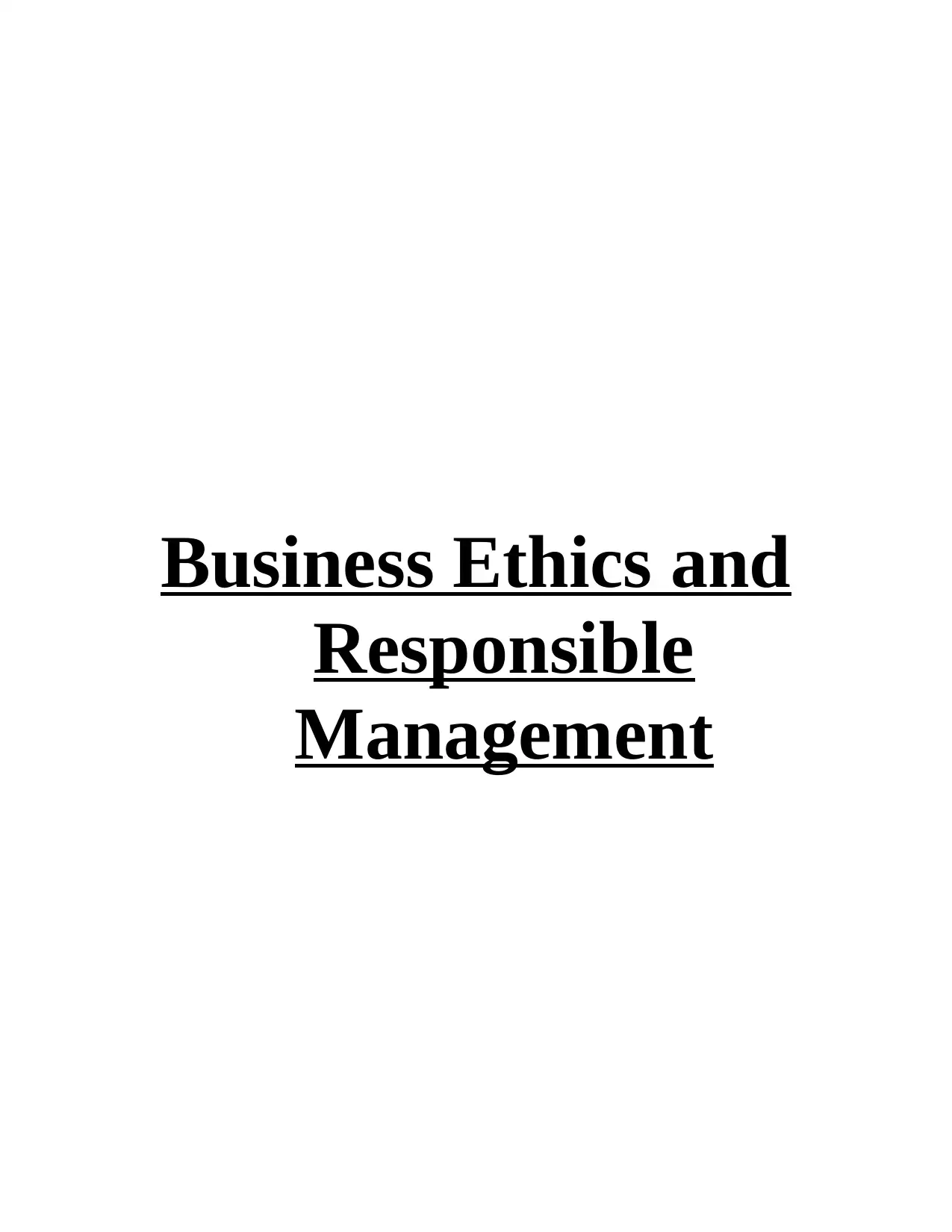
Business Ethics and
Responsible
Management
Responsible
Management
Paraphrase This Document
Need a fresh take? Get an instant paraphrase of this document with our AI Paraphraser
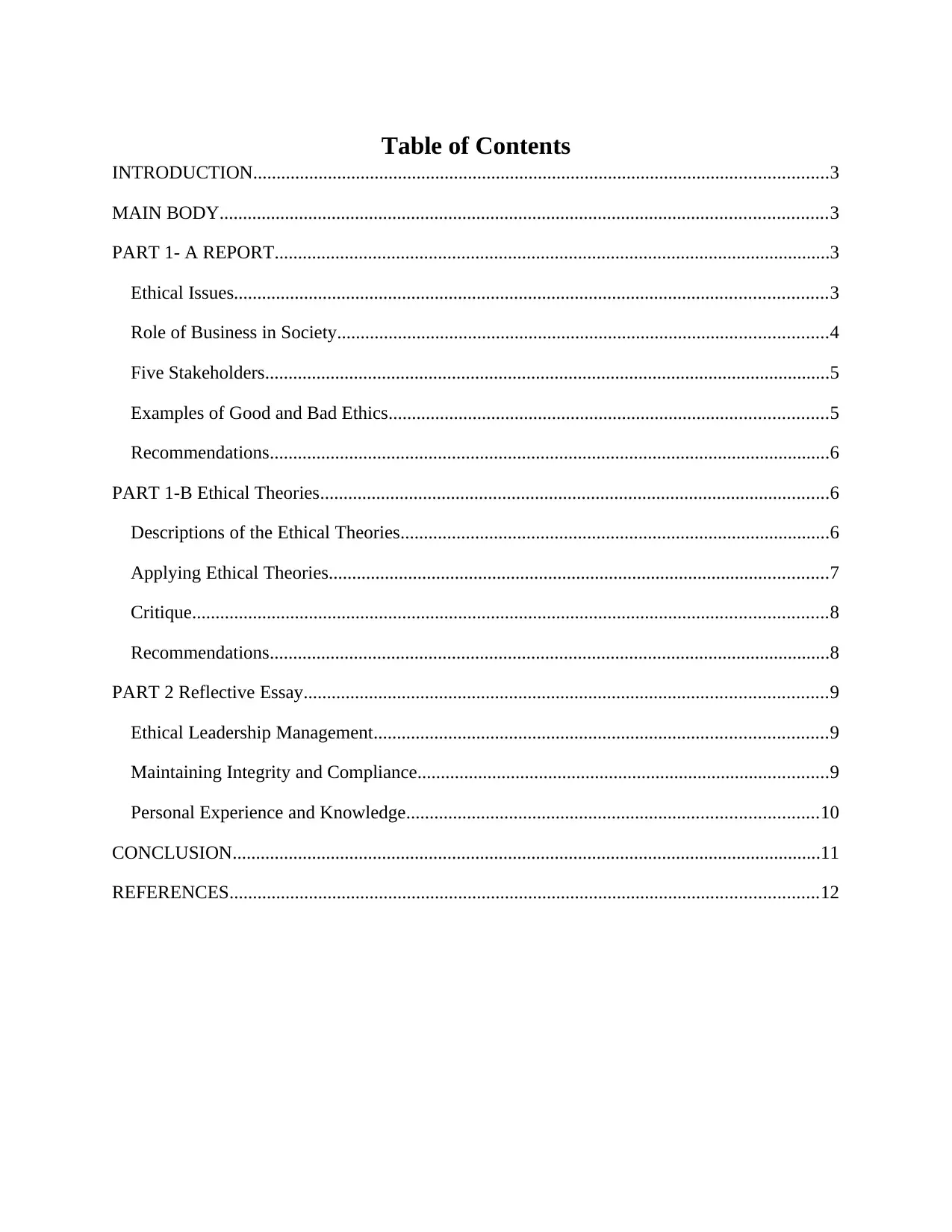
Table of Contents
INTRODUCTION...........................................................................................................................3
MAIN BODY..................................................................................................................................3
PART 1- A REPORT.......................................................................................................................3
Ethical Issues...............................................................................................................................3
Role of Business in Society.........................................................................................................4
Five Stakeholders.........................................................................................................................5
Examples of Good and Bad Ethics..............................................................................................5
Recommendations........................................................................................................................6
PART 1-B Ethical Theories.............................................................................................................6
Descriptions of the Ethical Theories............................................................................................6
Applying Ethical Theories...........................................................................................................7
Critique........................................................................................................................................8
Recommendations........................................................................................................................8
PART 2 Reflective Essay................................................................................................................9
Ethical Leadership Management.................................................................................................9
Maintaining Integrity and Compliance........................................................................................9
Personal Experience and Knowledge........................................................................................10
CONCLUSION..............................................................................................................................11
REFERENCES..............................................................................................................................12
INTRODUCTION...........................................................................................................................3
MAIN BODY..................................................................................................................................3
PART 1- A REPORT.......................................................................................................................3
Ethical Issues...............................................................................................................................3
Role of Business in Society.........................................................................................................4
Five Stakeholders.........................................................................................................................5
Examples of Good and Bad Ethics..............................................................................................5
Recommendations........................................................................................................................6
PART 1-B Ethical Theories.............................................................................................................6
Descriptions of the Ethical Theories............................................................................................6
Applying Ethical Theories...........................................................................................................7
Critique........................................................................................................................................8
Recommendations........................................................................................................................8
PART 2 Reflective Essay................................................................................................................9
Ethical Leadership Management.................................................................................................9
Maintaining Integrity and Compliance........................................................................................9
Personal Experience and Knowledge........................................................................................10
CONCLUSION..............................................................................................................................11
REFERENCES..............................................................................................................................12
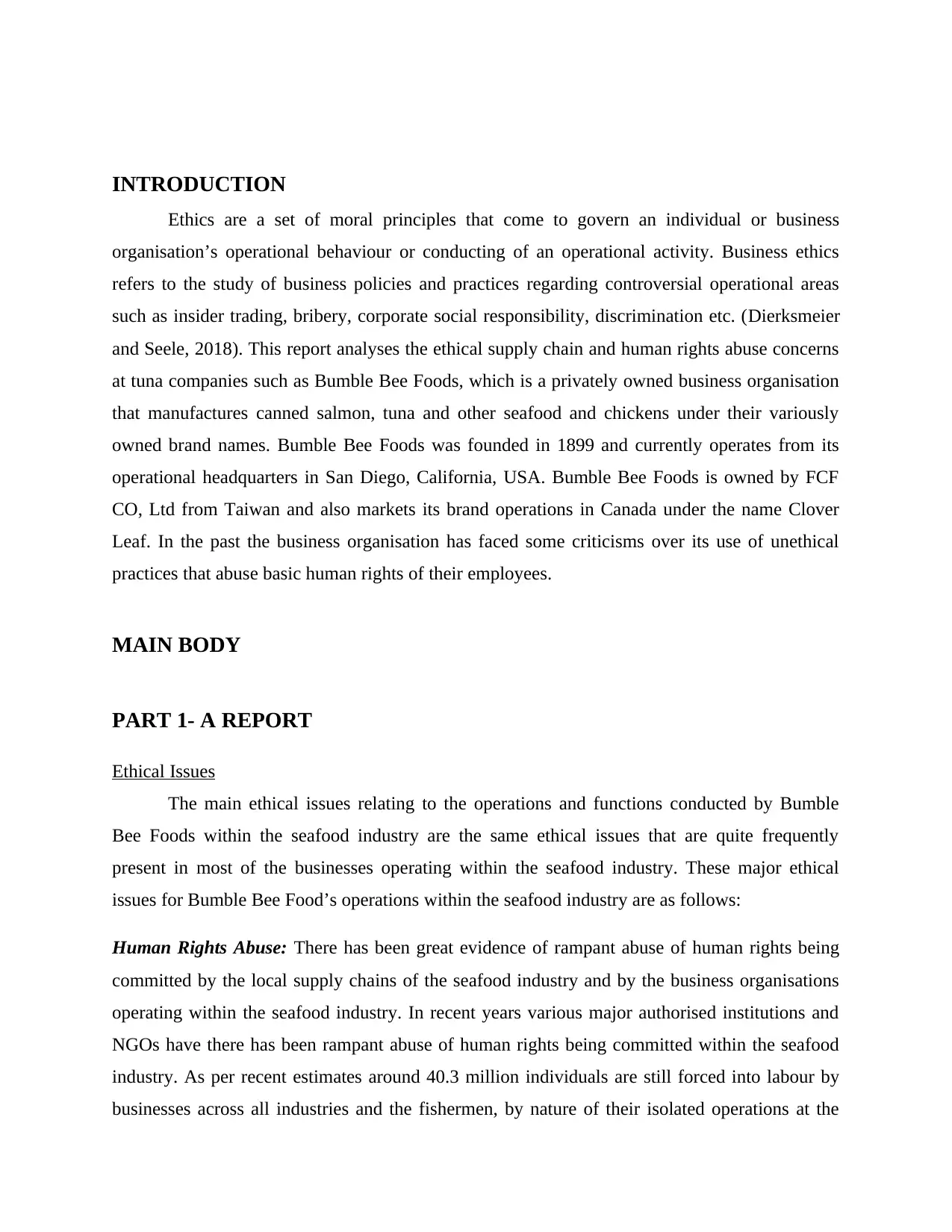
INTRODUCTION
Ethics are a set of moral principles that come to govern an individual or business
organisation’s operational behaviour or conducting of an operational activity. Business ethics
refers to the study of business policies and practices regarding controversial operational areas
such as insider trading, bribery, corporate social responsibility, discrimination etc. (Dierksmeier
and Seele, 2018). This report analyses the ethical supply chain and human rights abuse concerns
at tuna companies such as Bumble Bee Foods, which is a privately owned business organisation
that manufactures canned salmon, tuna and other seafood and chickens under their variously
owned brand names. Bumble Bee Foods was founded in 1899 and currently operates from its
operational headquarters in San Diego, California, USA. Bumble Bee Foods is owned by FCF
CO, Ltd from Taiwan and also markets its brand operations in Canada under the name Clover
Leaf. In the past the business organisation has faced some criticisms over its use of unethical
practices that abuse basic human rights of their employees.
MAIN BODY
PART 1- A REPORT
Ethical Issues
The main ethical issues relating to the operations and functions conducted by Bumble
Bee Foods within the seafood industry are the same ethical issues that are quite frequently
present in most of the businesses operating within the seafood industry. These major ethical
issues for Bumble Bee Food’s operations within the seafood industry are as follows:
Human Rights Abuse: There has been great evidence of rampant abuse of human rights being
committed by the local supply chains of the seafood industry and by the business organisations
operating within the seafood industry. In recent years various major authorised institutions and
NGOs have there has been rampant abuse of human rights being committed within the seafood
industry. As per recent estimates around 40.3 million individuals are still forced into labour by
businesses across all industries and the fishermen, by nature of their isolated operations at the
Ethics are a set of moral principles that come to govern an individual or business
organisation’s operational behaviour or conducting of an operational activity. Business ethics
refers to the study of business policies and practices regarding controversial operational areas
such as insider trading, bribery, corporate social responsibility, discrimination etc. (Dierksmeier
and Seele, 2018). This report analyses the ethical supply chain and human rights abuse concerns
at tuna companies such as Bumble Bee Foods, which is a privately owned business organisation
that manufactures canned salmon, tuna and other seafood and chickens under their variously
owned brand names. Bumble Bee Foods was founded in 1899 and currently operates from its
operational headquarters in San Diego, California, USA. Bumble Bee Foods is owned by FCF
CO, Ltd from Taiwan and also markets its brand operations in Canada under the name Clover
Leaf. In the past the business organisation has faced some criticisms over its use of unethical
practices that abuse basic human rights of their employees.
MAIN BODY
PART 1- A REPORT
Ethical Issues
The main ethical issues relating to the operations and functions conducted by Bumble
Bee Foods within the seafood industry are the same ethical issues that are quite frequently
present in most of the businesses operating within the seafood industry. These major ethical
issues for Bumble Bee Food’s operations within the seafood industry are as follows:
Human Rights Abuse: There has been great evidence of rampant abuse of human rights being
committed by the local supply chains of the seafood industry and by the business organisations
operating within the seafood industry. In recent years various major authorised institutions and
NGOs have there has been rampant abuse of human rights being committed within the seafood
industry. As per recent estimates around 40.3 million individuals are still forced into labour by
businesses across all industries and the fishermen, by nature of their isolated operations at the
⊘ This is a preview!⊘
Do you want full access?
Subscribe today to unlock all pages.

Trusted by 1+ million students worldwide
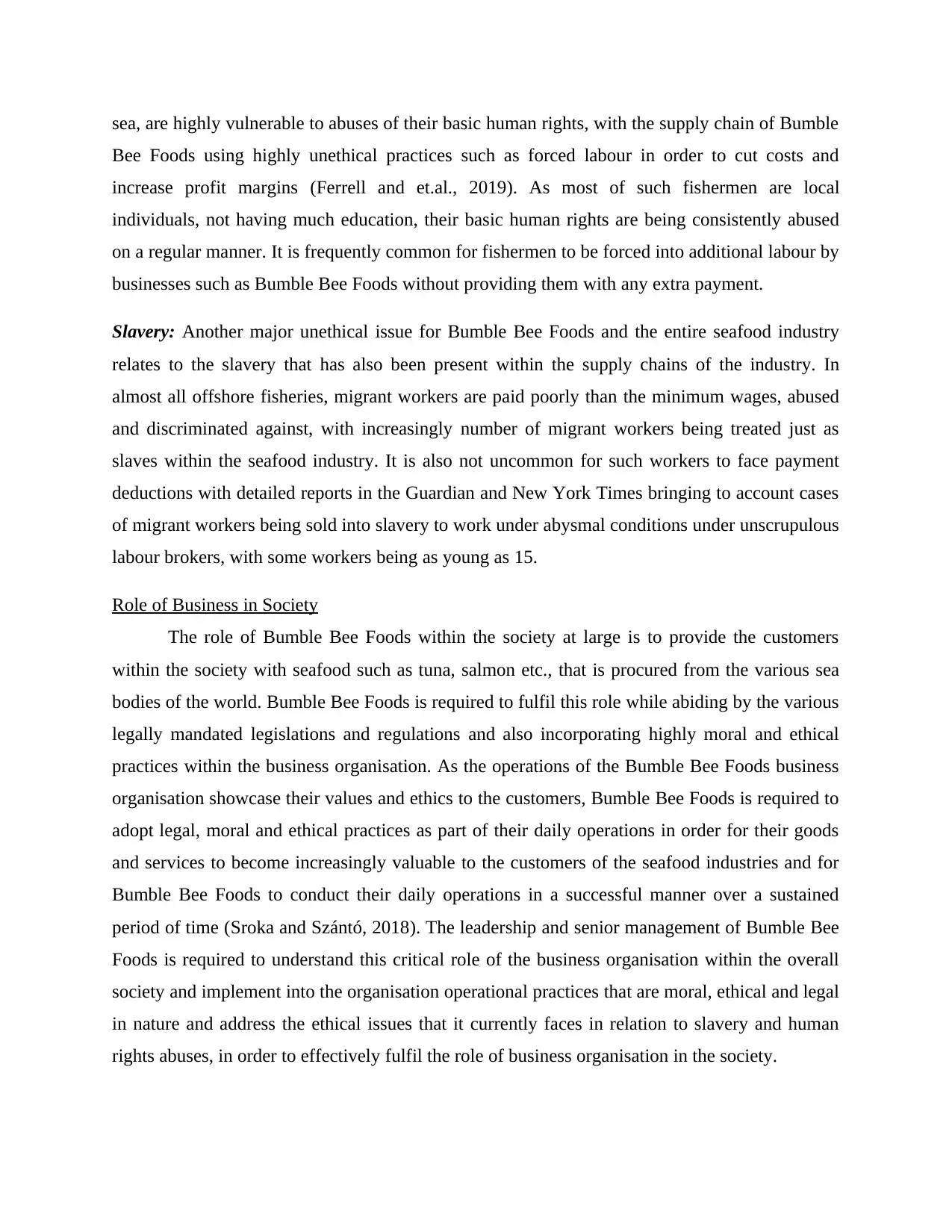
sea, are highly vulnerable to abuses of their basic human rights, with the supply chain of Bumble
Bee Foods using highly unethical practices such as forced labour in order to cut costs and
increase profit margins (Ferrell and et.al., 2019). As most of such fishermen are local
individuals, not having much education, their basic human rights are being consistently abused
on a regular manner. It is frequently common for fishermen to be forced into additional labour by
businesses such as Bumble Bee Foods without providing them with any extra payment.
Slavery: Another major unethical issue for Bumble Bee Foods and the entire seafood industry
relates to the slavery that has also been present within the supply chains of the industry. In
almost all offshore fisheries, migrant workers are paid poorly than the minimum wages, abused
and discriminated against, with increasingly number of migrant workers being treated just as
slaves within the seafood industry. It is also not uncommon for such workers to face payment
deductions with detailed reports in the Guardian and New York Times bringing to account cases
of migrant workers being sold into slavery to work under abysmal conditions under unscrupulous
labour brokers, with some workers being as young as 15.
Role of Business in Society
The role of Bumble Bee Foods within the society at large is to provide the customers
within the society with seafood such as tuna, salmon etc., that is procured from the various sea
bodies of the world. Bumble Bee Foods is required to fulfil this role while abiding by the various
legally mandated legislations and regulations and also incorporating highly moral and ethical
practices within the business organisation. As the operations of the Bumble Bee Foods business
organisation showcase their values and ethics to the customers, Bumble Bee Foods is required to
adopt legal, moral and ethical practices as part of their daily operations in order for their goods
and services to become increasingly valuable to the customers of the seafood industries and for
Bumble Bee Foods to conduct their daily operations in a successful manner over a sustained
period of time (Sroka and Szántó, 2018). The leadership and senior management of Bumble Bee
Foods is required to understand this critical role of the business organisation within the overall
society and implement into the organisation operational practices that are moral, ethical and legal
in nature and address the ethical issues that it currently faces in relation to slavery and human
rights abuses, in order to effectively fulfil the role of business organisation in the society.
Bee Foods using highly unethical practices such as forced labour in order to cut costs and
increase profit margins (Ferrell and et.al., 2019). As most of such fishermen are local
individuals, not having much education, their basic human rights are being consistently abused
on a regular manner. It is frequently common for fishermen to be forced into additional labour by
businesses such as Bumble Bee Foods without providing them with any extra payment.
Slavery: Another major unethical issue for Bumble Bee Foods and the entire seafood industry
relates to the slavery that has also been present within the supply chains of the industry. In
almost all offshore fisheries, migrant workers are paid poorly than the minimum wages, abused
and discriminated against, with increasingly number of migrant workers being treated just as
slaves within the seafood industry. It is also not uncommon for such workers to face payment
deductions with detailed reports in the Guardian and New York Times bringing to account cases
of migrant workers being sold into slavery to work under abysmal conditions under unscrupulous
labour brokers, with some workers being as young as 15.
Role of Business in Society
The role of Bumble Bee Foods within the society at large is to provide the customers
within the society with seafood such as tuna, salmon etc., that is procured from the various sea
bodies of the world. Bumble Bee Foods is required to fulfil this role while abiding by the various
legally mandated legislations and regulations and also incorporating highly moral and ethical
practices within the business organisation. As the operations of the Bumble Bee Foods business
organisation showcase their values and ethics to the customers, Bumble Bee Foods is required to
adopt legal, moral and ethical practices as part of their daily operations in order for their goods
and services to become increasingly valuable to the customers of the seafood industries and for
Bumble Bee Foods to conduct their daily operations in a successful manner over a sustained
period of time (Sroka and Szántó, 2018). The leadership and senior management of Bumble Bee
Foods is required to understand this critical role of the business organisation within the overall
society and implement into the organisation operational practices that are moral, ethical and legal
in nature and address the ethical issues that it currently faces in relation to slavery and human
rights abuses, in order to effectively fulfil the role of business organisation in the society.
Paraphrase This Document
Need a fresh take? Get an instant paraphrase of this document with our AI Paraphraser
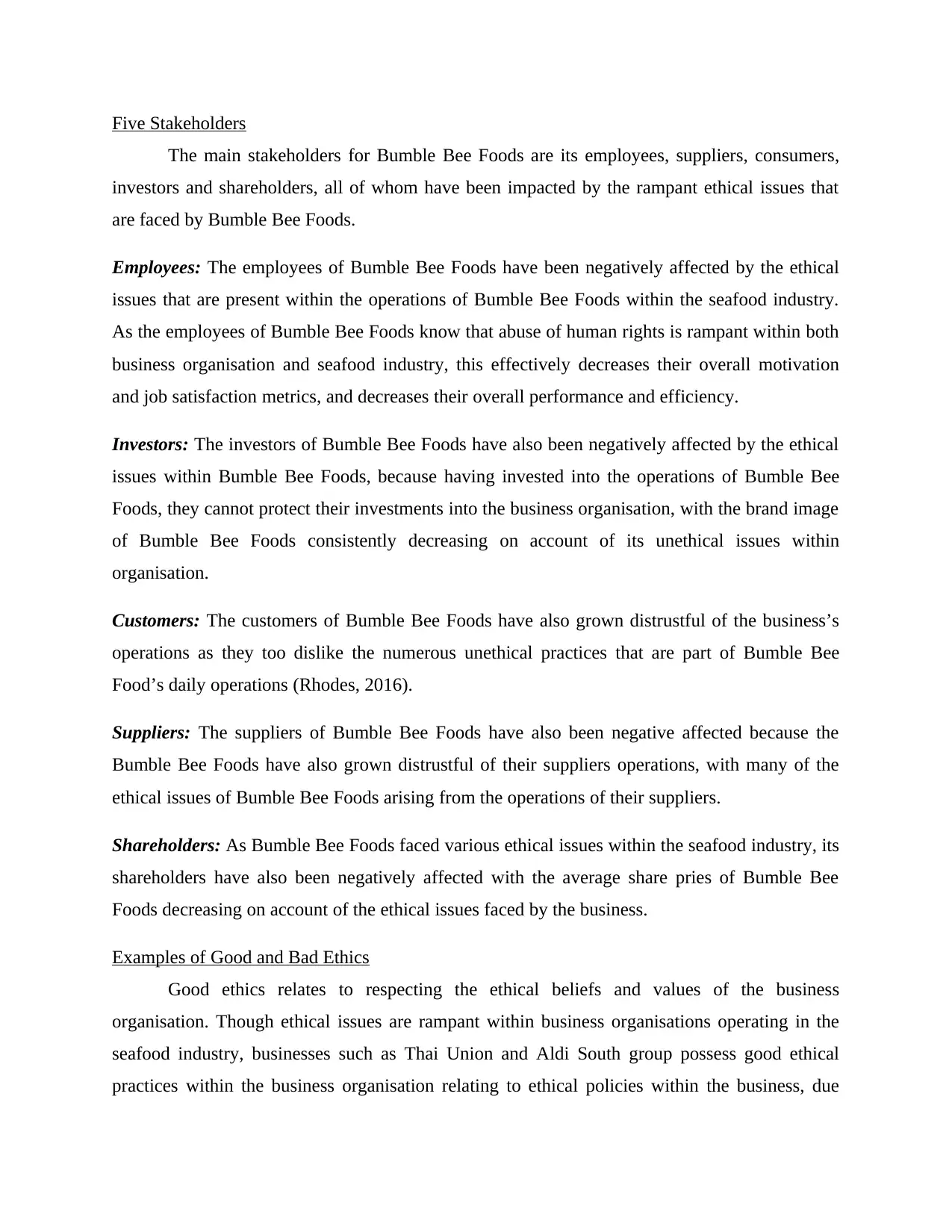
Five Stakeholders
The main stakeholders for Bumble Bee Foods are its employees, suppliers, consumers,
investors and shareholders, all of whom have been impacted by the rampant ethical issues that
are faced by Bumble Bee Foods.
Employees: The employees of Bumble Bee Foods have been negatively affected by the ethical
issues that are present within the operations of Bumble Bee Foods within the seafood industry.
As the employees of Bumble Bee Foods know that abuse of human rights is rampant within both
business organisation and seafood industry, this effectively decreases their overall motivation
and job satisfaction metrics, and decreases their overall performance and efficiency.
Investors: The investors of Bumble Bee Foods have also been negatively affected by the ethical
issues within Bumble Bee Foods, because having invested into the operations of Bumble Bee
Foods, they cannot protect their investments into the business organisation, with the brand image
of Bumble Bee Foods consistently decreasing on account of its unethical issues within
organisation.
Customers: The customers of Bumble Bee Foods have also grown distrustful of the business’s
operations as they too dislike the numerous unethical practices that are part of Bumble Bee
Food’s daily operations (Rhodes, 2016).
Suppliers: The suppliers of Bumble Bee Foods have also been negative affected because the
Bumble Bee Foods have also grown distrustful of their suppliers operations, with many of the
ethical issues of Bumble Bee Foods arising from the operations of their suppliers.
Shareholders: As Bumble Bee Foods faced various ethical issues within the seafood industry, its
shareholders have also been negatively affected with the average share pries of Bumble Bee
Foods decreasing on account of the ethical issues faced by the business.
Examples of Good and Bad Ethics
Good ethics relates to respecting the ethical beliefs and values of the business
organisation. Though ethical issues are rampant within business organisations operating in the
seafood industry, businesses such as Thai Union and Aldi South group possess good ethical
practices within the business organisation relating to ethical policies within the business, due
The main stakeholders for Bumble Bee Foods are its employees, suppliers, consumers,
investors and shareholders, all of whom have been impacted by the rampant ethical issues that
are faced by Bumble Bee Foods.
Employees: The employees of Bumble Bee Foods have been negatively affected by the ethical
issues that are present within the operations of Bumble Bee Foods within the seafood industry.
As the employees of Bumble Bee Foods know that abuse of human rights is rampant within both
business organisation and seafood industry, this effectively decreases their overall motivation
and job satisfaction metrics, and decreases their overall performance and efficiency.
Investors: The investors of Bumble Bee Foods have also been negatively affected by the ethical
issues within Bumble Bee Foods, because having invested into the operations of Bumble Bee
Foods, they cannot protect their investments into the business organisation, with the brand image
of Bumble Bee Foods consistently decreasing on account of its unethical issues within
organisation.
Customers: The customers of Bumble Bee Foods have also grown distrustful of the business’s
operations as they too dislike the numerous unethical practices that are part of Bumble Bee
Food’s daily operations (Rhodes, 2016).
Suppliers: The suppliers of Bumble Bee Foods have also been negative affected because the
Bumble Bee Foods have also grown distrustful of their suppliers operations, with many of the
ethical issues of Bumble Bee Foods arising from the operations of their suppliers.
Shareholders: As Bumble Bee Foods faced various ethical issues within the seafood industry, its
shareholders have also been negatively affected with the average share pries of Bumble Bee
Foods decreasing on account of the ethical issues faced by the business.
Examples of Good and Bad Ethics
Good ethics relates to respecting the ethical beliefs and values of the business
organisation. Though ethical issues are rampant within business organisations operating in the
seafood industry, businesses such as Thai Union and Aldi South group possess good ethical
practices within the business organisation relating to ethical policies within the business, due
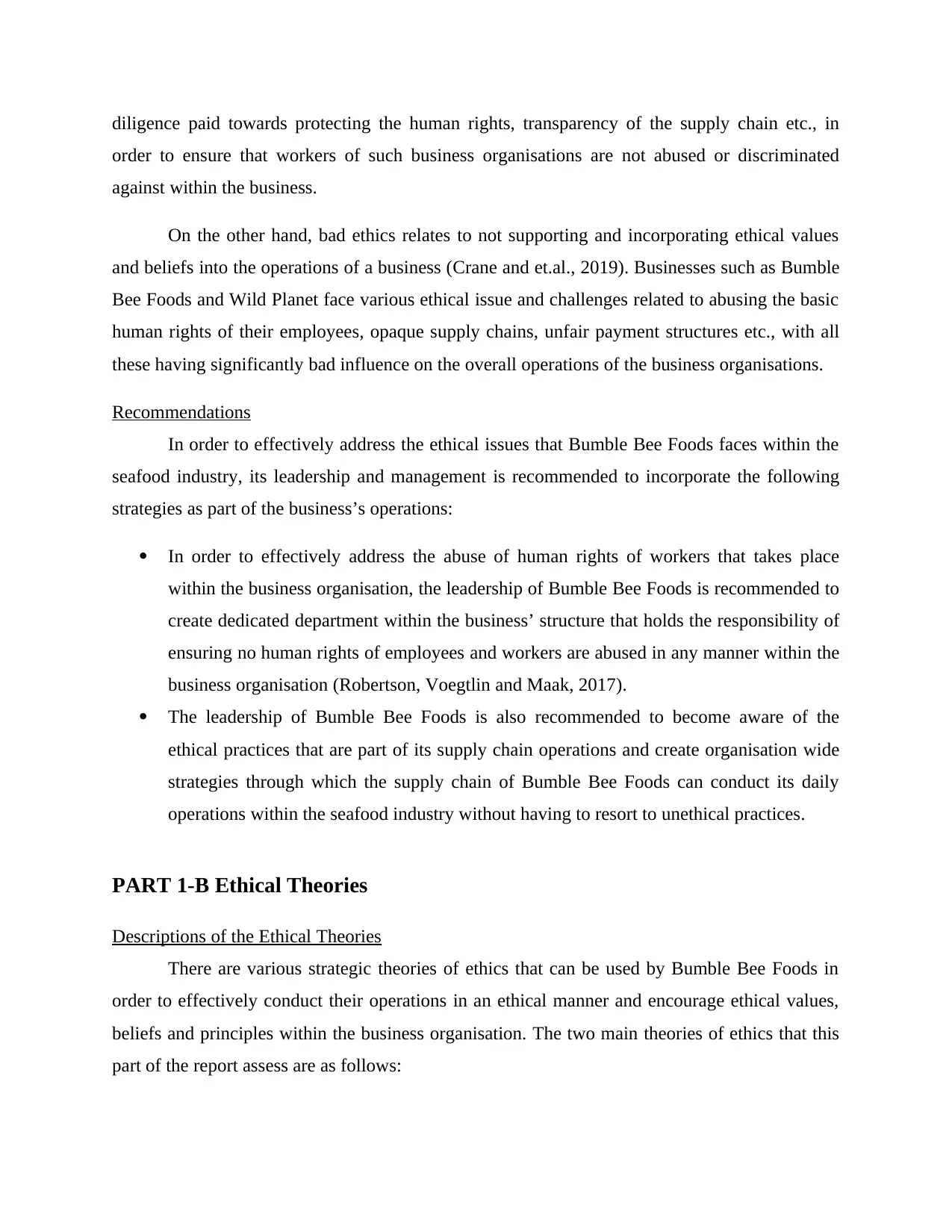
diligence paid towards protecting the human rights, transparency of the supply chain etc., in
order to ensure that workers of such business organisations are not abused or discriminated
against within the business.
On the other hand, bad ethics relates to not supporting and incorporating ethical values
and beliefs into the operations of a business (Crane and et.al., 2019). Businesses such as Bumble
Bee Foods and Wild Planet face various ethical issue and challenges related to abusing the basic
human rights of their employees, opaque supply chains, unfair payment structures etc., with all
these having significantly bad influence on the overall operations of the business organisations.
Recommendations
In order to effectively address the ethical issues that Bumble Bee Foods faces within the
seafood industry, its leadership and management is recommended to incorporate the following
strategies as part of the business’s operations:
In order to effectively address the abuse of human rights of workers that takes place
within the business organisation, the leadership of Bumble Bee Foods is recommended to
create dedicated department within the business’ structure that holds the responsibility of
ensuring no human rights of employees and workers are abused in any manner within the
business organisation (Robertson, Voegtlin and Maak, 2017).
The leadership of Bumble Bee Foods is also recommended to become aware of the
ethical practices that are part of its supply chain operations and create organisation wide
strategies through which the supply chain of Bumble Bee Foods can conduct its daily
operations within the seafood industry without having to resort to unethical practices.
PART 1-B Ethical Theories
Descriptions of the Ethical Theories
There are various strategic theories of ethics that can be used by Bumble Bee Foods in
order to effectively conduct their operations in an ethical manner and encourage ethical values,
beliefs and principles within the business organisation. The two main theories of ethics that this
part of the report assess are as follows:
order to ensure that workers of such business organisations are not abused or discriminated
against within the business.
On the other hand, bad ethics relates to not supporting and incorporating ethical values
and beliefs into the operations of a business (Crane and et.al., 2019). Businesses such as Bumble
Bee Foods and Wild Planet face various ethical issue and challenges related to abusing the basic
human rights of their employees, opaque supply chains, unfair payment structures etc., with all
these having significantly bad influence on the overall operations of the business organisations.
Recommendations
In order to effectively address the ethical issues that Bumble Bee Foods faces within the
seafood industry, its leadership and management is recommended to incorporate the following
strategies as part of the business’s operations:
In order to effectively address the abuse of human rights of workers that takes place
within the business organisation, the leadership of Bumble Bee Foods is recommended to
create dedicated department within the business’ structure that holds the responsibility of
ensuring no human rights of employees and workers are abused in any manner within the
business organisation (Robertson, Voegtlin and Maak, 2017).
The leadership of Bumble Bee Foods is also recommended to become aware of the
ethical practices that are part of its supply chain operations and create organisation wide
strategies through which the supply chain of Bumble Bee Foods can conduct its daily
operations within the seafood industry without having to resort to unethical practices.
PART 1-B Ethical Theories
Descriptions of the Ethical Theories
There are various strategic theories of ethics that can be used by Bumble Bee Foods in
order to effectively conduct their operations in an ethical manner and encourage ethical values,
beliefs and principles within the business organisation. The two main theories of ethics that this
part of the report assess are as follows:
⊘ This is a preview!⊘
Do you want full access?
Subscribe today to unlock all pages.

Trusted by 1+ million students worldwide
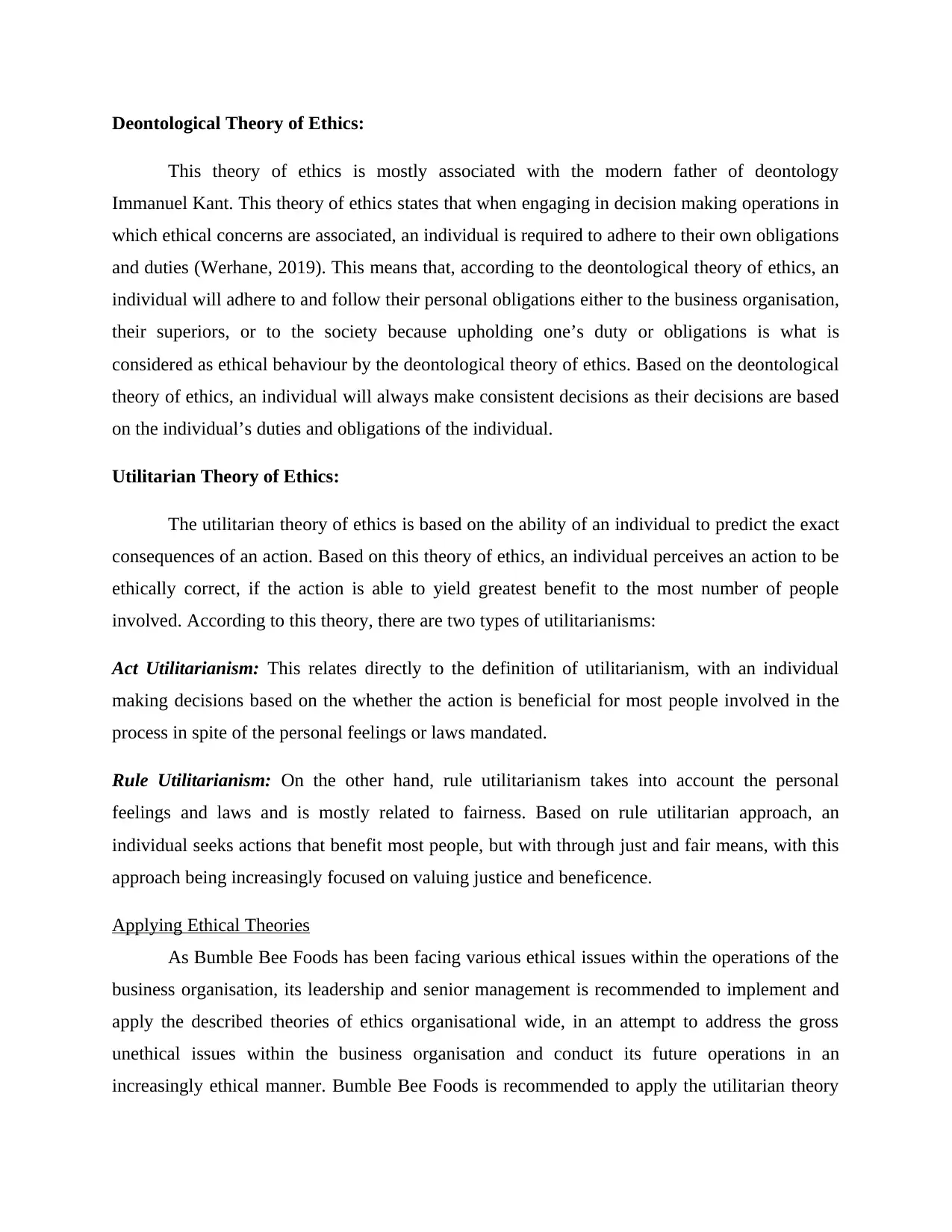
Deontological Theory of Ethics:
This theory of ethics is mostly associated with the modern father of deontology
Immanuel Kant. This theory of ethics states that when engaging in decision making operations in
which ethical concerns are associated, an individual is required to adhere to their own obligations
and duties (Werhane, 2019). This means that, according to the deontological theory of ethics, an
individual will adhere to and follow their personal obligations either to the business organisation,
their superiors, or to the society because upholding one’s duty or obligations is what is
considered as ethical behaviour by the deontological theory of ethics. Based on the deontological
theory of ethics, an individual will always make consistent decisions as their decisions are based
on the individual’s duties and obligations of the individual.
Utilitarian Theory of Ethics:
The utilitarian theory of ethics is based on the ability of an individual to predict the exact
consequences of an action. Based on this theory of ethics, an individual perceives an action to be
ethically correct, if the action is able to yield greatest benefit to the most number of people
involved. According to this theory, there are two types of utilitarianisms:
Act Utilitarianism: This relates directly to the definition of utilitarianism, with an individual
making decisions based on the whether the action is beneficial for most people involved in the
process in spite of the personal feelings or laws mandated.
Rule Utilitarianism: On the other hand, rule utilitarianism takes into account the personal
feelings and laws and is mostly related to fairness. Based on rule utilitarian approach, an
individual seeks actions that benefit most people, but with through just and fair means, with this
approach being increasingly focused on valuing justice and beneficence.
Applying Ethical Theories
As Bumble Bee Foods has been facing various ethical issues within the operations of the
business organisation, its leadership and senior management is recommended to implement and
apply the described theories of ethics organisational wide, in an attempt to address the gross
unethical issues within the business organisation and conduct its future operations in an
increasingly ethical manner. Bumble Bee Foods is recommended to apply the utilitarian theory
This theory of ethics is mostly associated with the modern father of deontology
Immanuel Kant. This theory of ethics states that when engaging in decision making operations in
which ethical concerns are associated, an individual is required to adhere to their own obligations
and duties (Werhane, 2019). This means that, according to the deontological theory of ethics, an
individual will adhere to and follow their personal obligations either to the business organisation,
their superiors, or to the society because upholding one’s duty or obligations is what is
considered as ethical behaviour by the deontological theory of ethics. Based on the deontological
theory of ethics, an individual will always make consistent decisions as their decisions are based
on the individual’s duties and obligations of the individual.
Utilitarian Theory of Ethics:
The utilitarian theory of ethics is based on the ability of an individual to predict the exact
consequences of an action. Based on this theory of ethics, an individual perceives an action to be
ethically correct, if the action is able to yield greatest benefit to the most number of people
involved. According to this theory, there are two types of utilitarianisms:
Act Utilitarianism: This relates directly to the definition of utilitarianism, with an individual
making decisions based on the whether the action is beneficial for most people involved in the
process in spite of the personal feelings or laws mandated.
Rule Utilitarianism: On the other hand, rule utilitarianism takes into account the personal
feelings and laws and is mostly related to fairness. Based on rule utilitarian approach, an
individual seeks actions that benefit most people, but with through just and fair means, with this
approach being increasingly focused on valuing justice and beneficence.
Applying Ethical Theories
As Bumble Bee Foods has been facing various ethical issues within the operations of the
business organisation, its leadership and senior management is recommended to implement and
apply the described theories of ethics organisational wide, in an attempt to address the gross
unethical issues within the business organisation and conduct its future operations in an
increasingly ethical manner. Bumble Bee Foods is recommended to apply the utilitarian theory
Paraphrase This Document
Need a fresh take? Get an instant paraphrase of this document with our AI Paraphraser
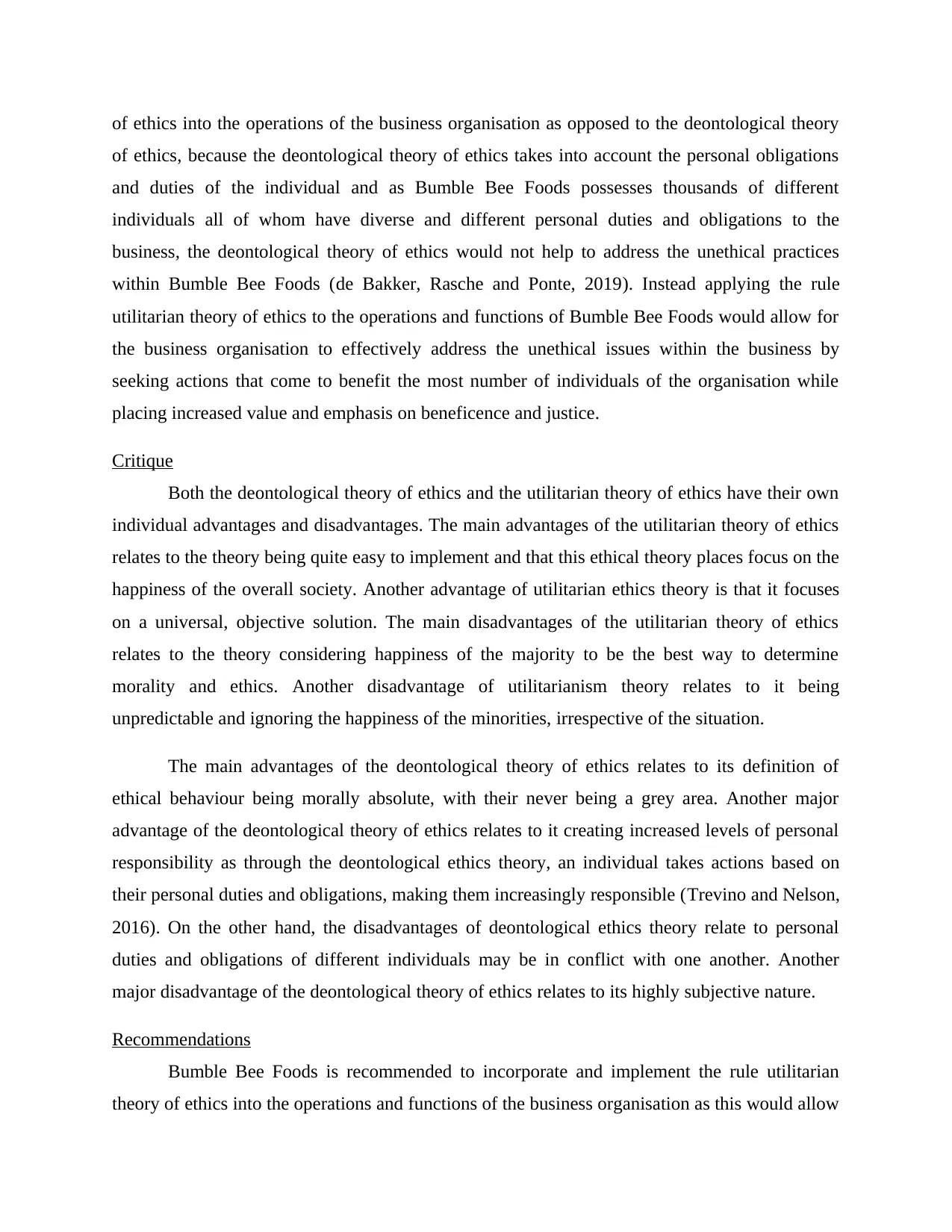
of ethics into the operations of the business organisation as opposed to the deontological theory
of ethics, because the deontological theory of ethics takes into account the personal obligations
and duties of the individual and as Bumble Bee Foods possesses thousands of different
individuals all of whom have diverse and different personal duties and obligations to the
business, the deontological theory of ethics would not help to address the unethical practices
within Bumble Bee Foods (de Bakker, Rasche and Ponte, 2019). Instead applying the rule
utilitarian theory of ethics to the operations and functions of Bumble Bee Foods would allow for
the business organisation to effectively address the unethical issues within the business by
seeking actions that come to benefit the most number of individuals of the organisation while
placing increased value and emphasis on beneficence and justice.
Critique
Both the deontological theory of ethics and the utilitarian theory of ethics have their own
individual advantages and disadvantages. The main advantages of the utilitarian theory of ethics
relates to the theory being quite easy to implement and that this ethical theory places focus on the
happiness of the overall society. Another advantage of utilitarian ethics theory is that it focuses
on a universal, objective solution. The main disadvantages of the utilitarian theory of ethics
relates to the theory considering happiness of the majority to be the best way to determine
morality and ethics. Another disadvantage of utilitarianism theory relates to it being
unpredictable and ignoring the happiness of the minorities, irrespective of the situation.
The main advantages of the deontological theory of ethics relates to its definition of
ethical behaviour being morally absolute, with their never being a grey area. Another major
advantage of the deontological theory of ethics relates to it creating increased levels of personal
responsibility as through the deontological ethics theory, an individual takes actions based on
their personal duties and obligations, making them increasingly responsible (Trevino and Nelson,
2016). On the other hand, the disadvantages of deontological ethics theory relate to personal
duties and obligations of different individuals may be in conflict with one another. Another
major disadvantage of the deontological theory of ethics relates to its highly subjective nature.
Recommendations
Bumble Bee Foods is recommended to incorporate and implement the rule utilitarian
theory of ethics into the operations and functions of the business organisation as this would allow
of ethics, because the deontological theory of ethics takes into account the personal obligations
and duties of the individual and as Bumble Bee Foods possesses thousands of different
individuals all of whom have diverse and different personal duties and obligations to the
business, the deontological theory of ethics would not help to address the unethical practices
within Bumble Bee Foods (de Bakker, Rasche and Ponte, 2019). Instead applying the rule
utilitarian theory of ethics to the operations and functions of Bumble Bee Foods would allow for
the business organisation to effectively address the unethical issues within the business by
seeking actions that come to benefit the most number of individuals of the organisation while
placing increased value and emphasis on beneficence and justice.
Critique
Both the deontological theory of ethics and the utilitarian theory of ethics have their own
individual advantages and disadvantages. The main advantages of the utilitarian theory of ethics
relates to the theory being quite easy to implement and that this ethical theory places focus on the
happiness of the overall society. Another advantage of utilitarian ethics theory is that it focuses
on a universal, objective solution. The main disadvantages of the utilitarian theory of ethics
relates to the theory considering happiness of the majority to be the best way to determine
morality and ethics. Another disadvantage of utilitarianism theory relates to it being
unpredictable and ignoring the happiness of the minorities, irrespective of the situation.
The main advantages of the deontological theory of ethics relates to its definition of
ethical behaviour being morally absolute, with their never being a grey area. Another major
advantage of the deontological theory of ethics relates to it creating increased levels of personal
responsibility as through the deontological ethics theory, an individual takes actions based on
their personal duties and obligations, making them increasingly responsible (Trevino and Nelson,
2016). On the other hand, the disadvantages of deontological ethics theory relate to personal
duties and obligations of different individuals may be in conflict with one another. Another
major disadvantage of the deontological theory of ethics relates to its highly subjective nature.
Recommendations
Bumble Bee Foods is recommended to incorporate and implement the rule utilitarian
theory of ethics into the operations and functions of the business organisation as this would allow
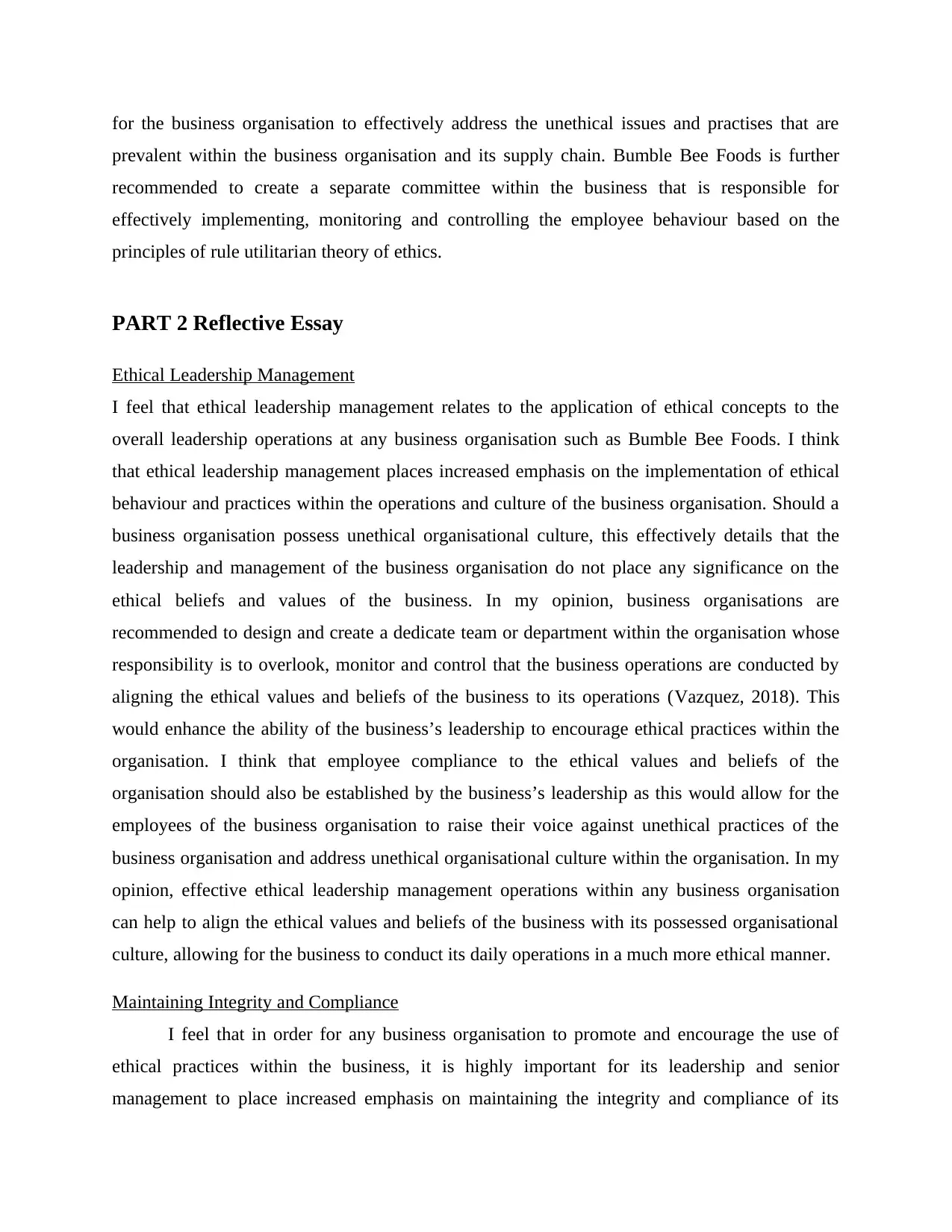
for the business organisation to effectively address the unethical issues and practises that are
prevalent within the business organisation and its supply chain. Bumble Bee Foods is further
recommended to create a separate committee within the business that is responsible for
effectively implementing, monitoring and controlling the employee behaviour based on the
principles of rule utilitarian theory of ethics.
PART 2 Reflective Essay
Ethical Leadership Management
I feel that ethical leadership management relates to the application of ethical concepts to the
overall leadership operations at any business organisation such as Bumble Bee Foods. I think
that ethical leadership management places increased emphasis on the implementation of ethical
behaviour and practices within the operations and culture of the business organisation. Should a
business organisation possess unethical organisational culture, this effectively details that the
leadership and management of the business organisation do not place any significance on the
ethical beliefs and values of the business. In my opinion, business organisations are
recommended to design and create a dedicate team or department within the organisation whose
responsibility is to overlook, monitor and control that the business operations are conducted by
aligning the ethical values and beliefs of the business to its operations (Vazquez, 2018). This
would enhance the ability of the business’s leadership to encourage ethical practices within the
organisation. I think that employee compliance to the ethical values and beliefs of the
organisation should also be established by the business’s leadership as this would allow for the
employees of the business organisation to raise their voice against unethical practices of the
business organisation and address unethical organisational culture within the organisation. In my
opinion, effective ethical leadership management operations within any business organisation
can help to align the ethical values and beliefs of the business with its possessed organisational
culture, allowing for the business to conduct its daily operations in a much more ethical manner.
Maintaining Integrity and Compliance
I feel that in order for any business organisation to promote and encourage the use of
ethical practices within the business, it is highly important for its leadership and senior
management to place increased emphasis on maintaining the integrity and compliance of its
prevalent within the business organisation and its supply chain. Bumble Bee Foods is further
recommended to create a separate committee within the business that is responsible for
effectively implementing, monitoring and controlling the employee behaviour based on the
principles of rule utilitarian theory of ethics.
PART 2 Reflective Essay
Ethical Leadership Management
I feel that ethical leadership management relates to the application of ethical concepts to the
overall leadership operations at any business organisation such as Bumble Bee Foods. I think
that ethical leadership management places increased emphasis on the implementation of ethical
behaviour and practices within the operations and culture of the business organisation. Should a
business organisation possess unethical organisational culture, this effectively details that the
leadership and management of the business organisation do not place any significance on the
ethical beliefs and values of the business. In my opinion, business organisations are
recommended to design and create a dedicate team or department within the organisation whose
responsibility is to overlook, monitor and control that the business operations are conducted by
aligning the ethical values and beliefs of the business to its operations (Vazquez, 2018). This
would enhance the ability of the business’s leadership to encourage ethical practices within the
organisation. I think that employee compliance to the ethical values and beliefs of the
organisation should also be established by the business’s leadership as this would allow for the
employees of the business organisation to raise their voice against unethical practices of the
business organisation and address unethical organisational culture within the organisation. In my
opinion, effective ethical leadership management operations within any business organisation
can help to align the ethical values and beliefs of the business with its possessed organisational
culture, allowing for the business to conduct its daily operations in a much more ethical manner.
Maintaining Integrity and Compliance
I feel that in order for any business organisation to promote and encourage the use of
ethical practices within the business, it is highly important for its leadership and senior
management to place increased emphasis on maintaining the integrity and compliance of its
⊘ This is a preview!⊘
Do you want full access?
Subscribe today to unlock all pages.

Trusted by 1+ million students worldwide
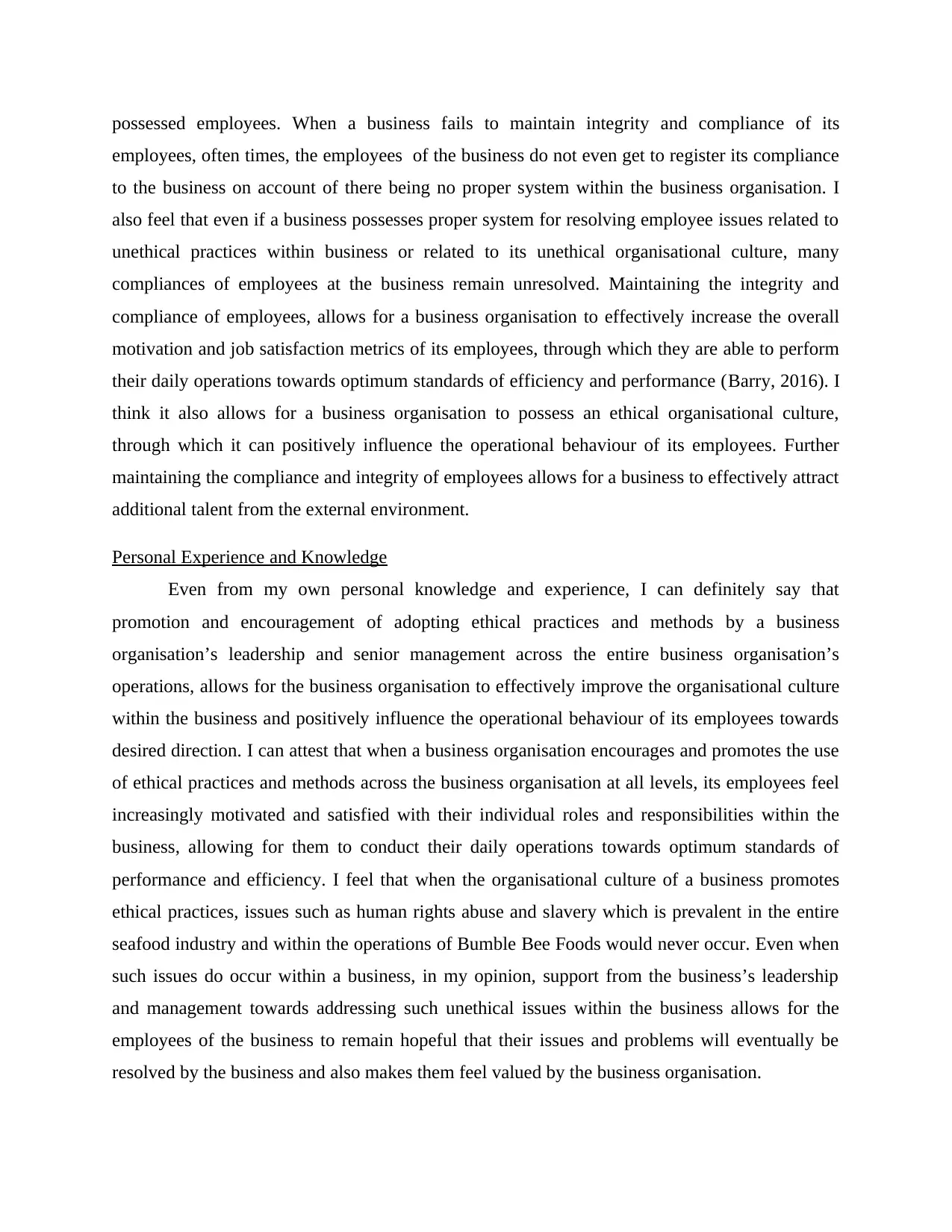
possessed employees. When a business fails to maintain integrity and compliance of its
employees, often times, the employees of the business do not even get to register its compliance
to the business on account of there being no proper system within the business organisation. I
also feel that even if a business possesses proper system for resolving employee issues related to
unethical practices within business or related to its unethical organisational culture, many
compliances of employees at the business remain unresolved. Maintaining the integrity and
compliance of employees, allows for a business organisation to effectively increase the overall
motivation and job satisfaction metrics of its employees, through which they are able to perform
their daily operations towards optimum standards of efficiency and performance (Barry, 2016). I
think it also allows for a business organisation to possess an ethical organisational culture,
through which it can positively influence the operational behaviour of its employees. Further
maintaining the compliance and integrity of employees allows for a business to effectively attract
additional talent from the external environment.
Personal Experience and Knowledge
Even from my own personal knowledge and experience, I can definitely say that
promotion and encouragement of adopting ethical practices and methods by a business
organisation’s leadership and senior management across the entire business organisation’s
operations, allows for the business organisation to effectively improve the organisational culture
within the business and positively influence the operational behaviour of its employees towards
desired direction. I can attest that when a business organisation encourages and promotes the use
of ethical practices and methods across the business organisation at all levels, its employees feel
increasingly motivated and satisfied with their individual roles and responsibilities within the
business, allowing for them to conduct their daily operations towards optimum standards of
performance and efficiency. I feel that when the organisational culture of a business promotes
ethical practices, issues such as human rights abuse and slavery which is prevalent in the entire
seafood industry and within the operations of Bumble Bee Foods would never occur. Even when
such issues do occur within a business, in my opinion, support from the business’s leadership
and management towards addressing such unethical issues within the business allows for the
employees of the business to remain hopeful that their issues and problems will eventually be
resolved by the business and also makes them feel valued by the business organisation.
employees, often times, the employees of the business do not even get to register its compliance
to the business on account of there being no proper system within the business organisation. I
also feel that even if a business possesses proper system for resolving employee issues related to
unethical practices within business or related to its unethical organisational culture, many
compliances of employees at the business remain unresolved. Maintaining the integrity and
compliance of employees, allows for a business organisation to effectively increase the overall
motivation and job satisfaction metrics of its employees, through which they are able to perform
their daily operations towards optimum standards of efficiency and performance (Barry, 2016). I
think it also allows for a business organisation to possess an ethical organisational culture,
through which it can positively influence the operational behaviour of its employees. Further
maintaining the compliance and integrity of employees allows for a business to effectively attract
additional talent from the external environment.
Personal Experience and Knowledge
Even from my own personal knowledge and experience, I can definitely say that
promotion and encouragement of adopting ethical practices and methods by a business
organisation’s leadership and senior management across the entire business organisation’s
operations, allows for the business organisation to effectively improve the organisational culture
within the business and positively influence the operational behaviour of its employees towards
desired direction. I can attest that when a business organisation encourages and promotes the use
of ethical practices and methods across the business organisation at all levels, its employees feel
increasingly motivated and satisfied with their individual roles and responsibilities within the
business, allowing for them to conduct their daily operations towards optimum standards of
performance and efficiency. I feel that when the organisational culture of a business promotes
ethical practices, issues such as human rights abuse and slavery which is prevalent in the entire
seafood industry and within the operations of Bumble Bee Foods would never occur. Even when
such issues do occur within a business, in my opinion, support from the business’s leadership
and management towards addressing such unethical issues within the business allows for the
employees of the business to remain hopeful that their issues and problems will eventually be
resolved by the business and also makes them feel valued by the business organisation.
Paraphrase This Document
Need a fresh take? Get an instant paraphrase of this document with our AI Paraphraser
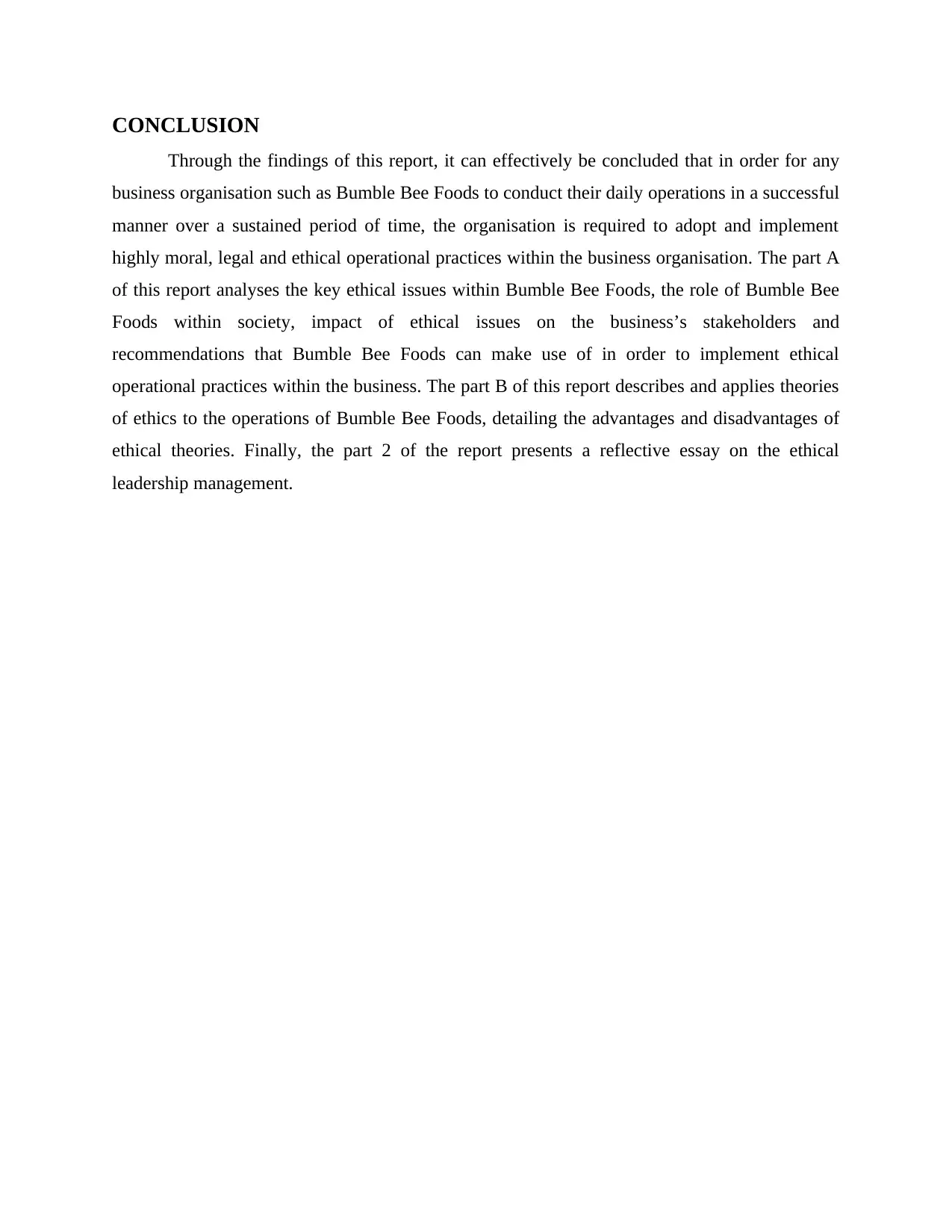
CONCLUSION
Through the findings of this report, it can effectively be concluded that in order for any
business organisation such as Bumble Bee Foods to conduct their daily operations in a successful
manner over a sustained period of time, the organisation is required to adopt and implement
highly moral, legal and ethical operational practices within the business organisation. The part A
of this report analyses the key ethical issues within Bumble Bee Foods, the role of Bumble Bee
Foods within society, impact of ethical issues on the business’s stakeholders and
recommendations that Bumble Bee Foods can make use of in order to implement ethical
operational practices within the business. The part B of this report describes and applies theories
of ethics to the operations of Bumble Bee Foods, detailing the advantages and disadvantages of
ethical theories. Finally, the part 2 of the report presents a reflective essay on the ethical
leadership management.
Through the findings of this report, it can effectively be concluded that in order for any
business organisation such as Bumble Bee Foods to conduct their daily operations in a successful
manner over a sustained period of time, the organisation is required to adopt and implement
highly moral, legal and ethical operational practices within the business organisation. The part A
of this report analyses the key ethical issues within Bumble Bee Foods, the role of Bumble Bee
Foods within society, impact of ethical issues on the business’s stakeholders and
recommendations that Bumble Bee Foods can make use of in order to implement ethical
operational practices within the business. The part B of this report describes and applies theories
of ethics to the operations of Bumble Bee Foods, detailing the advantages and disadvantages of
ethical theories. Finally, the part 2 of the report presents a reflective essay on the ethical
leadership management.
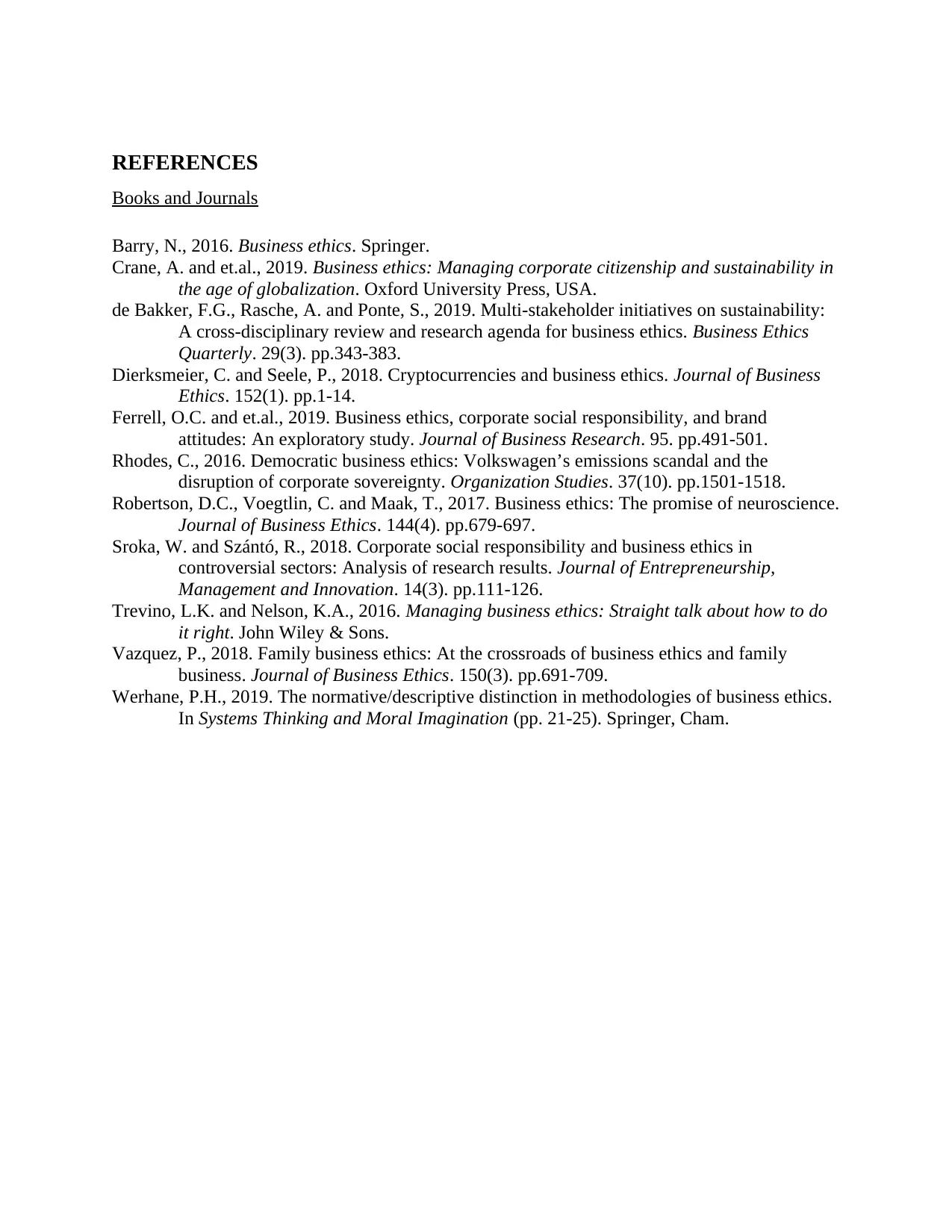
REFERENCES
Books and Journals
Barry, N., 2016. Business ethics. Springer.
Crane, A. and et.al., 2019. Business ethics: Managing corporate citizenship and sustainability in
the age of globalization. Oxford University Press, USA.
de Bakker, F.G., Rasche, A. and Ponte, S., 2019. Multi-stakeholder initiatives on sustainability:
A cross-disciplinary review and research agenda for business ethics. Business Ethics
Quarterly. 29(3). pp.343-383.
Dierksmeier, C. and Seele, P., 2018. Cryptocurrencies and business ethics. Journal of Business
Ethics. 152(1). pp.1-14.
Ferrell, O.C. and et.al., 2019. Business ethics, corporate social responsibility, and brand
attitudes: An exploratory study. Journal of Business Research. 95. pp.491-501.
Rhodes, C., 2016. Democratic business ethics: Volkswagen’s emissions scandal and the
disruption of corporate sovereignty. Organization Studies. 37(10). pp.1501-1518.
Robertson, D.C., Voegtlin, C. and Maak, T., 2017. Business ethics: The promise of neuroscience.
Journal of Business Ethics. 144(4). pp.679-697.
Sroka, W. and Szántó, R., 2018. Corporate social responsibility and business ethics in
controversial sectors: Analysis of research results. Journal of Entrepreneurship,
Management and Innovation. 14(3). pp.111-126.
Trevino, L.K. and Nelson, K.A., 2016. Managing business ethics: Straight talk about how to do
it right. John Wiley & Sons.
Vazquez, P., 2018. Family business ethics: At the crossroads of business ethics and family
business. Journal of Business Ethics. 150(3). pp.691-709.
Werhane, P.H., 2019. The normative/descriptive distinction in methodologies of business ethics.
In Systems Thinking and Moral Imagination (pp. 21-25). Springer, Cham.
Books and Journals
Barry, N., 2016. Business ethics. Springer.
Crane, A. and et.al., 2019. Business ethics: Managing corporate citizenship and sustainability in
the age of globalization. Oxford University Press, USA.
de Bakker, F.G., Rasche, A. and Ponte, S., 2019. Multi-stakeholder initiatives on sustainability:
A cross-disciplinary review and research agenda for business ethics. Business Ethics
Quarterly. 29(3). pp.343-383.
Dierksmeier, C. and Seele, P., 2018. Cryptocurrencies and business ethics. Journal of Business
Ethics. 152(1). pp.1-14.
Ferrell, O.C. and et.al., 2019. Business ethics, corporate social responsibility, and brand
attitudes: An exploratory study. Journal of Business Research. 95. pp.491-501.
Rhodes, C., 2016. Democratic business ethics: Volkswagen’s emissions scandal and the
disruption of corporate sovereignty. Organization Studies. 37(10). pp.1501-1518.
Robertson, D.C., Voegtlin, C. and Maak, T., 2017. Business ethics: The promise of neuroscience.
Journal of Business Ethics. 144(4). pp.679-697.
Sroka, W. and Szántó, R., 2018. Corporate social responsibility and business ethics in
controversial sectors: Analysis of research results. Journal of Entrepreneurship,
Management and Innovation. 14(3). pp.111-126.
Trevino, L.K. and Nelson, K.A., 2016. Managing business ethics: Straight talk about how to do
it right. John Wiley & Sons.
Vazquez, P., 2018. Family business ethics: At the crossroads of business ethics and family
business. Journal of Business Ethics. 150(3). pp.691-709.
Werhane, P.H., 2019. The normative/descriptive distinction in methodologies of business ethics.
In Systems Thinking and Moral Imagination (pp. 21-25). Springer, Cham.
⊘ This is a preview!⊘
Do you want full access?
Subscribe today to unlock all pages.

Trusted by 1+ million students worldwide
1 out of 12
Related Documents
Your All-in-One AI-Powered Toolkit for Academic Success.
+13062052269
info@desklib.com
Available 24*7 on WhatsApp / Email
![[object Object]](/_next/static/media/star-bottom.7253800d.svg)
Unlock your academic potential
Copyright © 2020–2025 A2Z Services. All Rights Reserved. Developed and managed by ZUCOL.





